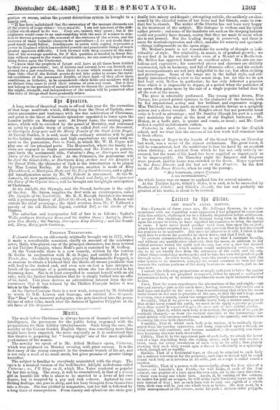The week before Christmas is always barren of dramatic and
musical intelligence, the purveyors for the public being engrossed with the preparations for their holiday entertainments. Such being the case, the novelty at the Covent Garden English Opera was something more than might have been expected, the more especially as it is understood that this theatre is preparing for " boxing-night" one of the most splendid pantomimes of the season.
The novelty we speak of is Mr. Alfred Mellon's opera, Virtorine, which was produced on Monday evening, with great success. It is the first essay of the work composer in the dramatic branch of his art, and is not only a worr of nu small merit, but gives promise of greater things hereafter.
The subject is familiar to everybody acquainted with the stage. The opera is a musical version of the well-known Adelphi melodrama called Vietorine ; or, Pll Sleep on It, which Mrs. Yates rendered so popular b7 her fine acting. The story, it will be remembered, is that of a young girl in humble life who is about to be married to a lover of her own degree, but is tempted by a gay and rich seducer. Agitated by con- flicting feelings, she goes to sleep, and her busy thoughts form themselves into a dream. She has yielded to temptation, mailer fall is followed by a long train of consequenoes. -From lim", n ;tad splendour she auks gra-
dually into misery and despair • attempting suicide, she suddenly awakes, roused. by the cheerful voices of her lover and her Mends, come to cos: duct her to church. The writer of the libretto has not been very happy in his treatment of the subject. His dialogue is verbose and his lyrics rather prosaic ; and some of the incidents are such as the sleeping heroine could not possibly have dreamt, seeing that they are made do occur when she is not present. But the leading design is preserved, and there is room for musical expression and effect, and also for scenery and spectacle —things indispensable on the opera stage. Mr. Mellon's music is not remarkable for novelty of thought or indi- viduality of style. But originality, in music, is of gradual growth ; we do not Lind it in the earliest works even of a Mozart or a Beethoven. Mr. Mellon has approved himself an excellent artist. His airs are me- lodious and expressive; his concerted pieces and choruses are skilfully constructed, rich in harmony, and full of dramatic effect; and his orches- tral accompaniments are not only delightful to the ear, but often striking and picturesque. Some of the songs are in the ballad style, and evi- dently introduced with a view to the music shop, but for this we do not find fault with Mellon in particular; he has only followed a praetice from which it is impossible to depart, at a period when the publisher of an opera often gains more by the sale of a single popular ballad than by all the rest of the music.
The piece is admirably performed. The young prime donna, Miss Parepa, has gained golden opinions in the character of the heroine, both by her impassioned acting and her brilliant and expressive singing. Miss Thirlwall, too, has made an advance in public favour as a sprightly actress and a clever vocalist. Mr. Haigh's sweet but not powerful tenor voice is heard to advantage ; and Mr. Bentley (though his part is a small one) maintains his place at the head of our English baritones. Mr. Honey, in a buffo part, is quaint and comic, as usual ; and Mr. Corti makes a capital melodramatic ruffian. Victorine, in short, does honour to its author and to the:English school, and we trust that the success of his first work will stimulate him to fresh efforts.
The fetum of Roger to the boards of the Grand Opera, on Thursday last week, was a scene of the utmost enthusiasm. The great tenor, it will be remembered, had the misfortune to lose his band by an accident when shotoing ; an accident from which he has not only entirely re- covered, but the want of his hand has been supplied so ingeniously as to be imperceptible. On Thursday night the Emperor and Empress were present, and the house was crowded to the doers. Roger appeared in the -Anne. Blanche and the last act of the Prophite. In the first scene of the Dame Blanche, when ho sang the passage,
" Mes bonramis, croyez d'avance A ma reconnaissance,."
the whole house rose en masse to applaud him for several minutes.
At the Theatre Lyric, Gliick's Oefee, it is said, is to be succeeded by Beethoven's _Edell° ; and Gliiek's e/rmide, the last and probably the greatest of his works, is about to be revived.






























 Previous page
Previous page